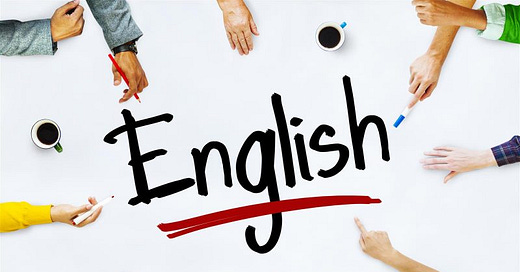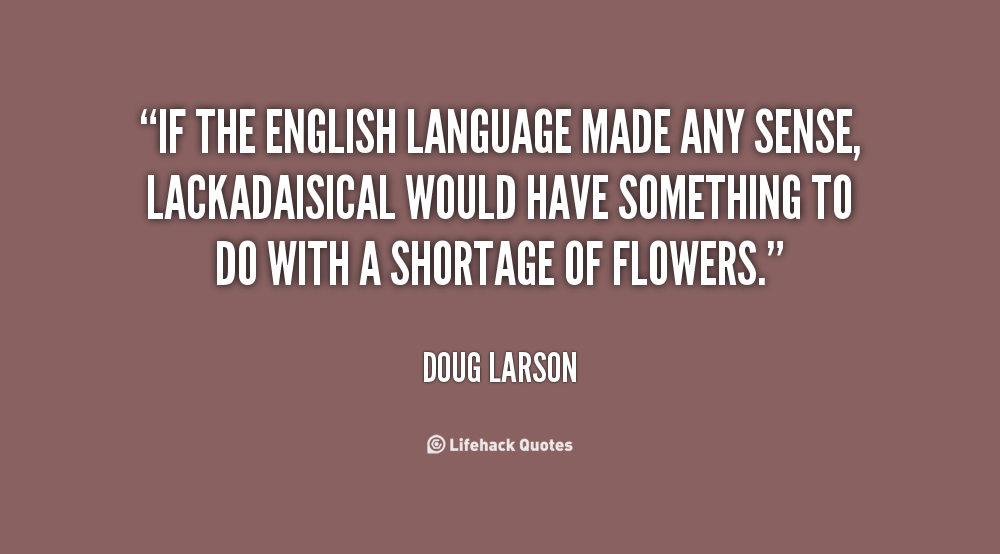English Is the Roadmap of Our Entire Culture
Which is why you need to add these three great words to your vocabulary
It’s no secret that I am an enthusiast of the English language. As a wee sprog, I used to read the dictionary for fun, compiling lists of words that intrigued me, and then test driving them on other sprogs who found my lexicon (and me) strange and off-putting.
I was a nerd. A word-nerd. I still am.
English has 170,000 words, more than any other language. Russian comes in second with 150,000. Although it hearkens from the Indo-European family of languages, English is West Germanic in origin (26%), with a heavy influence of Old Norman French (30%), Old Norse (4%), and Latin (30%). It is roughly 1,400 years old, which makes me feel pretty good about myself since I’ve got a birthday coming up, and I’m nowhere near that age. Yet.
But what I most love about English (although this phenomenon is hardly exclusive to our language) is how influenced it is by the patois of the streets. This was as true of the Early Modern English spoken by Shakespeare and his contemporaries as it is of the African-American Vernacular English of today—which was itself influenced by creole and West-African languages. American English is so much better for it. Because of AAVE, we have delicious words like “lit,” “woke,” “bae,” “rachet,” and phrases like “I feel you,” and “straight-up gangsta.” Any attempt to dissuade me from my love of AAVE will be immediately (and rightly) dismissed as racist snobbery.
Every generation throws at least fifty new and glorious words into the bonfire—we may no longer refer to young women as “flappers,” but we do have “E-girl” and “E-boy” to describe a type of semi-Goth individual that prefers using the Internet to express herself or himself (as opposed to face-to-face interaction).
Over 400 million people worldwide speak English as their first language. 1.1 billion speak it as their second language. If you divide Chinese into its sub-variants, English is the most spoken language on the planet, and in its rudimentary uses, one of the easiest languages to learn. We have no gendered nouns or fancy declensions. Even broken English can be understood by native speakers. It may lack the beautiful sonorous fluidity of French or Italian, but English gets the job done. It is the language of expansion. Find yourself in most corners of the globe, and you can usually get by with at least a few words of English.
Writing English, however … this is tricky, even for native speakers. Our spelling alone is problematic at a basic level (you’re, your, there, their, its, it’s) and that’s before you attempt to learn the arcane and complicated rules of grammar. Native speakers have an intuitive grasp of the language’s complexities. “That’s an interesting little hobby you have there” sounds normal. “That’s a little interesting hobby” does not. This is a distinction that is lost on most advertisers here in Italy. They get it wrong almost 100% of the time.
As an homage to our glorious lingua franca, we here at Cappuccino would like to pay our respects by introducing you to three words that may or may not be familiar to you. We recommend that you read them out loud, or write them on a pad of paper, or type them into your phone—in other words, that you interact with them in a way that will make them easier to remember. To this day, when I come across a word I love, I screengrab it and drop it in my Notes app. I collect words like a chipmunk collects nuts, which is to say rabidly.
Spoken English is a lot looser and less formal than written English, which is why trotting out some of these words during a casual exchange between friends might earn you a raised eyebrow or five. Press on! Earn your right to be considered a pretentious boor by everyone you meet. At least you won’t have to look up these fabulous words the next time you run across them in The New Yorker.
Etiolate (ˈē-tē-ə-ˌlāt)
To hear it, click here.
Transitive verb
: to bleach and alter the natural development of (a green plant) by excluding sunlight
2a: to make pale
b: to deprive of natural vigor : make feeble
This is a marvelous word, fit to purpose as an adjective (etiolated) as well as a verb.
Here’s how to use it in a sentence:
Listening to him mansplain feminine hygiene products to me, a woman, greatly etiolated my patience with him.
Metonym (ˈme-tə-ˌnim) or Metonymy
noun
1: a word, name, or expression used as a substitute for something else with which it is closely associated. For example, Washington is a metonym for the federal government of the U.S., or “crown” in “lands belonging to the crown”).
In Cappuccino’s opinion, this is one of the best words ever created. English, already a terse language, is forever looking to abbreviate itself so it can get to the point faster. We are besotted with acronyms (e.g., ASAP, AWOL) and figures of speech that describe something without the tiresome effort of actually describing it. This is how I got in trouble on Facebook with the word “Russians.”
During the 2016 election when the Russian government was actively plotted to install Trump in the White House, I made the mistake of referring to it metonymically as “the Russians.” I might have added the f-word as a qualifier to that phrase (i.e., “the f*** Russians.”) I meant no disrespect to the Russian people, but Facebooks censors operate in ones and zeros, not the finer nuances of language, so I got banned for a month. A month! All this to say, be careful using metonyms.
Here’s how to use one in a sentence:
When you are watching a documentary on the sexual predations of someone like Harvey Weinstein and feel compelled to mutter, "Hollywood is sick,” you are using the word “Hollywood” as a metonym for the movie industry itself.
Phlegethon [ fleg-uh-thon, flej- ]
noun
Also called Pyr·i·phleg·e·thon [pir-uh-fleg-uh-thon, -flej-] .Classical Mythology. a river of fire, one of five rivers surrounding Hades.
(often lowercase) a stream of fire or fiery light.
This is the perfect visual noun. We can be smote by the phlegethon of a wrathful god or burned to cinders by the phlegethon of an angry dragon. And heck, that’s just an average day for me.
Here’s how to use it in a sentence:
During the 2016 presidential debate, a phlegethon of vitriol streamed from my mouth every time Donald Trump’s face flashed across my screen.
And there you have it! Three fantastic words to add to your already impressive vocabulary. Savor them, friend. It’s a flexible and invigorating language we share. As its stewards, it is our responsibility to express our mother tongue with all the elegance and eloquence it deserves.
Do you have some juicy words to share? If so, I want to hear them. Leave your contributions in the comments section below.






Like you, I love words (I'm a writer, after all), but in my writing I've tried to err more on the side of Hemingway's simplicity. I don't want to stump my reader...though once in a great while I'll throw in a $10 word just for giggles.
Maladroit is awesome and it's such a nice, fancy little way of insulting someone just a wee bit! Also, I'm not sure this counts, but I love the word "Preakness" of the Preakness Stakes. Love it!